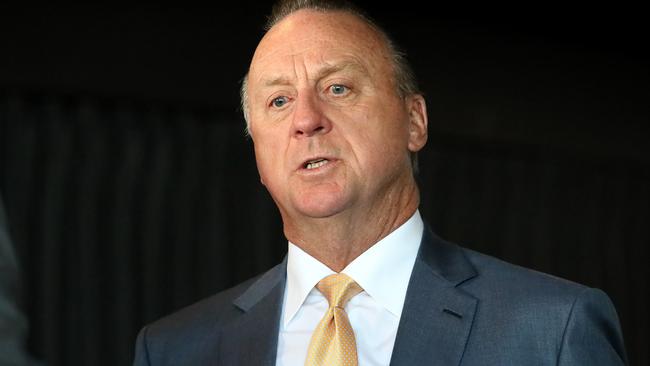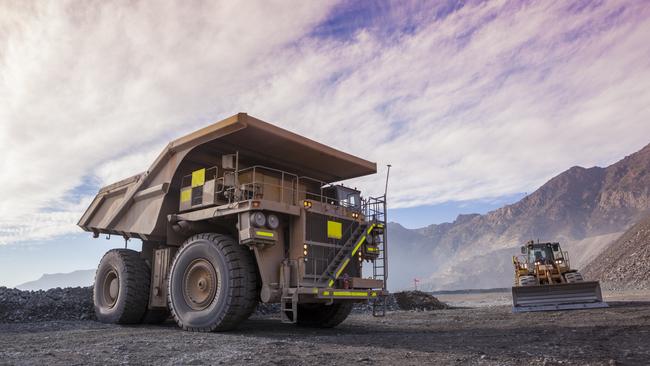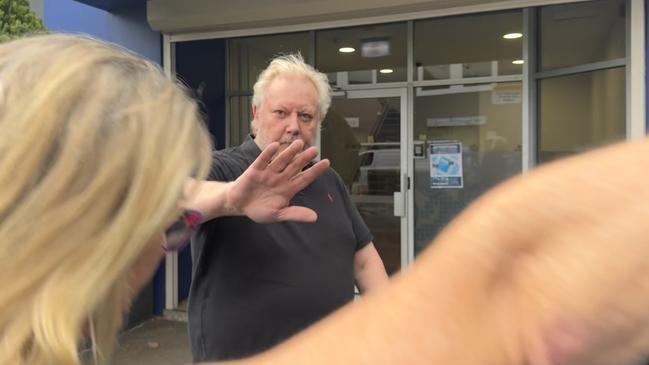Why MinRes’ board went for the slow axing of chief executive Chris Ellison
Any other chief executive would have been forced out a long time ago. This is no ordinary boss.

Business
Don't miss out on the headlines from Business. Followed categories will be added to My News.
Mineral Resources chairman James McClements had immediate dismissal of Chris Ellison as one of two options after the damning findings of a legal probe into the chief executive’s past behaviour came back. The other was to go slowly.
Ellison, who on paper is worth nearly $900m, was using MinRes as his personal plaything for years. This includes having staff work on his properties and boat; getting the miner to buy goods and services on his behalf; as well as disclosed, but highly-conflicted payments.
The board had looked the other way over some of these deal while Ellison kept driving the growth. But the findings of a Herbert Smith Freehills probe into Ellison’s and MinRes’ history that crossed a line.
This looked at the circumstances behind MinRes acquired a debt heavy private equipment supplier that owned a debt to a third company co-owned by Ellison. This transaction allowed MinRes to extinguish the debt and was at the heart of Ellison’s secret payment of funds to the tax office. None of the related party deals were disclosed at the time of MinRes’ listing nearly two decades ago.

McClements went through these revelations in detail to big investors during a series of face-to-face meetings in recent days.
As well as dismissal of Ellison, the other option presented to investors was an orderly exit of MinRes’ powerful founder and chief executive. One way or the other, Ellison was to be gone.
While the view wasn’t unanimous — and at times strongly contested — the overwhelming feedback from MinRes’ biggest investors was to go with the phased exit of Ellison over the next 12 to 18 months. MinRes’s second biggest shareholder L1 Capital was among those driving the medium term exit plan. Others have urged ASIC to take a look at some of the transactions.
While the final call represents a long, slow exit, came with series of financial penalties for the CEO, which in total have amounted to around $18m, included forfeited options. Ellison, who last year took home a $5m package, has accepted these.
McClements rightly also offered his own scalp ahead of next year’s annual meeting as part of a much-needed governance overhaul governance of MinRes, which has seen a miner with no real succession plan and lacking the checks and balances needed to oversee its powerful CEO.
Any other chief executive not named Chris Ellison would have been forced out long time ago. But, as 11.5 per cent shareholder, investors in his corner see him as the driving force building the miner with iron ore, lithium and until recently onshore gas, from a relative junior into a near-$8bn player. They find it impossible to split Ellison from MinRes and view the hard-talking boss as critical to navigating any cyclical downturn.
By taking on a founder CEO, McClements faced the toughest situation of any chair. He knew he had to act but instant dismissal would result in a much deeper cratering of the MinRes shares and lead to a possible break-up. MinRes shares closed off nearly 10 per cent on Monday.
For investors, there’s eerie similarities with WiseTech. The exit of a powerful and long-term founding chief executive has exposed almost no succession planning and has left the company at the whim of the founder. However, it’s also the same founder who delivered high-growth and velocity, with big questions over how the company will perform following their exit.
At WiseTech, White had support from investors right up until the last moment, when the writing was on the wall.

In MinRes’ case shares have surged more than 150 per cent over the past five years. At the peak of the lithium boom the one-time $3 stock was on the way to being $100, in the process making Ellison worth $2bn on paper.
Ultimately this comes down to whether investors are prepared to wear the grubbiness over the next 12 to 18 months for MinRes to emerge from the other side intact.
It also takes McClements (and any successor) at face value there will be more done to put separation between Ellison’s personal affairs and MinRes.
A new board committee, which may have well been called the Ellison oversight committee, has been formed which will monitor the chief executive over the transition.
This slow exit from MinRes still leaves plenty of uncomfortable questions for shareholders, including whether Ellison will have an ongoing role once he formally leaves the company. At the same time there are questions over what sort of input Ellison will have in selecting his successor. McClements has left the way for a new chairman to select the next CEO.
With the loss of confidence in his leadership and a potential for the next 12 to 18 months to cause a more disruption, Ellison has to recognise the longer he stays the more damage he will cause. For MinRes’ sake he needs to speed up the exit.
johnstone@theaustralian.com.au
More Coverage
Originally published as Why MinRes’ board went for the slow axing of chief executive Chris Ellison





